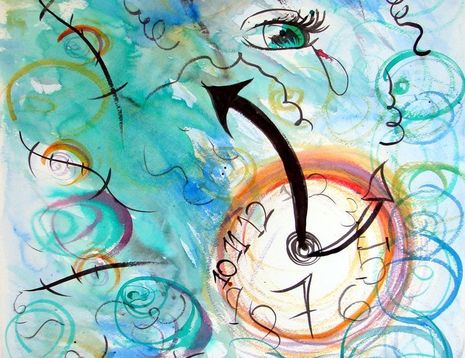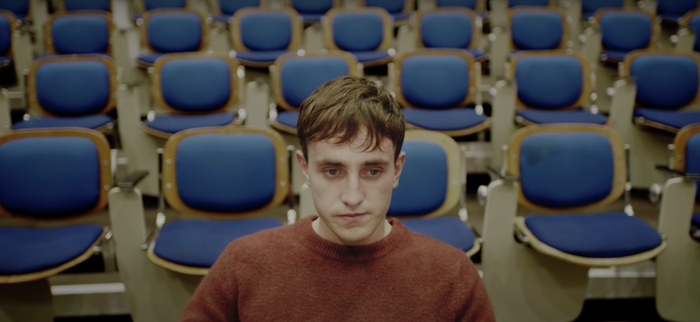Reflections on ‘Time Lived, Without Its Flow’
‘I’ll not be writing about death, but an altered condition of life’: Lewis Gorton shares how Denise Riley’s essay, ‘Time Lived, Without its Flow’, has reshaped their perception of the pandemic

"Six months after: A summer has gone, a cold autumn is setting in, but I’ve no sense of my time as having any duration or any future. Time is a plateau. I only know whether an event came before or after...”
If I didn’t know the source of this quote and you’d told me it was someone observing the passing of time around September of 2020, I may well have believed you. But this is, however, a quote from Denise Riley’s ‘Time Lived, Without Its Flow’, an essay produced by Riley following the death of her son and her experience with the passing of time.
I picked it up from a local library this summer. Things were starting to look closer to ‘normal’, which is a strange — possibly incorrect — use of the phrase considering the events of the last 22 months, but it is the best one I could think of to encapsulate this general ethos. After awkwardly stumbling around the library like a lost sheep, I managed to bag what looked ‘adult’ enough to reaffirm that my teen years had in fact come to an end during the second half of the pandemic, but short enough to not actually have to do any real work to read it. This happened to be Riley’s essay.
“While still dystopian, this ‘new normal’ at least allowed linear time to begin to flow again”
Like many others in the pandemic, the first lockdown completely deconstructed my perception of time — or, as Riley describes this feeling, ‘time dilation’. This isn’t the usual physical usage of the term, one which I’m sure strikes fear into many readers who are studying the physical sciences. Riley describes it as ‘our temporal perception’s elasticity, its capacity to be baggy’. My father described this more adequately in his burly, Northern voice while recovering from COVID: “every day feels like a Sunday.”
Indeed, it’s this Sunday-ness that I’m sure many of us felt during the first lockdown: the feeling of having absolutely nothing to do, nowhere to go, no events planned for the day, while a million-and-one perturbing thoughts whiz around your head.
Of course, eventually things started going back to normal, or so it seemed. Restaurants and pubs reopened during the summer. ‘The new normal’ of mask wearing and social distancing, albeit without lockdown, began setting in (which, while writing this out, feels eerily close to Arthur Birling’s ‘unsinkable Titanic’ quote from An Inspector Calls that’s etched into memory from Year 11 English Literature). Small group gatherings started taking place. While still dystopian, this ‘new normal’ at least allowed linear time to begin to flow again, where there were tenses and people started talking about future plans. However, all good things must come to an end, which was especially true for those of us enduring local lockdowns during this period before the inevitable return to university.
“Somehow, I couldn’t quite piece together in what order these events happened”
I’ll skip past the events in Michaelmas 2020 and the eventual lockdown. Not because it wasn’t horrific and we weren’t robbed of the Cambridge experience that many of us had self-promised, but because the flow of time didn’t really change that much for me; I was fortunate enough to live in a house of great people where we could continue much of the social life that had occurred beforehand, albeit more restrictive and with a smaller group of people.
The third lockdown is when I truly felt what Riley calls the ‘cut through any usual feeling of chronology’. I had recently lost a relative to COVID and other complications, and not long after that another relative, this time to non-COVID related illnesses. Without trying to engage in what Riley describes as: “some hearers ... will comment briskly on your efforts, ‘You mean, like the feeling of disturbed time you get after a bad break-up’”, I was also dealing with the emotional repercussions of the end of a three-year relationship, which, without getting into details, was extremely toxic for its majority.
Family issues had also crept up, leading to some form of emotional explosion and the eventual outing of myself as bi to a small subset of my family. Yet, somehow, I couldn’t quite piece together in what order these events happened. I found myself wandering around in the blinding dark and deafening silence of a snowier-than-usual winter every night along the canal, crippled by loneliness, trying to process any form of timeline, timescale, or even piecing together my own feelings of whether these life events felt near or far.
I’m not quite sure how I intend to end this thought-vomit that I’ve somehow been able to spew onto this page. I suppose the main takeaway I’d suggest is to read Riley’s essay yourself, and maybe keep it in mind for a bit of relatable, self-indulging reading for when you inevitably feel like this once again. That’s both a recommendation for anyone who reached this point, and myself. This feeling of time warping and the un-linearising of time is a universal one, one which I’m sure to experience yet again in my life. However, what I find extraordinary is every person has experienced this at some point over the past 22 months.
Riley decided to open this essay with, ‘I’ll not be writing about death, but an altered condition of life’. This goal that she had in mind is the precise reason that, while I’m fortunate enough to have never experienced the loss of a child, Riley remoulded my perception of the pandemic.
 News / SU reluctantly registers controversial women’s soc18 December 2025
News / SU reluctantly registers controversial women’s soc18 December 2025 News / Dons warn PM about Vet School closure16 December 2025
News / Dons warn PM about Vet School closure16 December 2025 Features / Should I stay or should I go? Cambridge students and alumni reflect on how their memories stay with them15 December 2025
Features / Should I stay or should I go? Cambridge students and alumni reflect on how their memories stay with them15 December 2025 News / Cambridge study finds students learn better with notes than AI13 December 2025
News / Cambridge study finds students learn better with notes than AI13 December 2025 Fashion / The art of the formal outfit 18 December 2025
Fashion / The art of the formal outfit 18 December 2025









